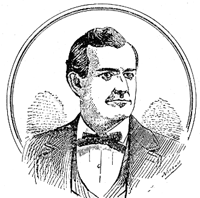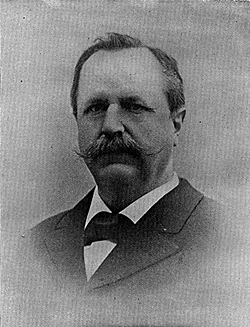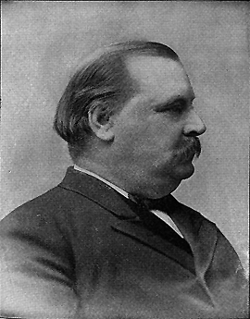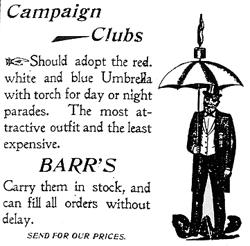The Democrats entered their convention deeply divided. The severe depression had made their sitting president, Grover Cleveland, wildly unpopular (the biography link here is to the White House history pages). Cleveland, the first Democratic president since the Civil War, had served two terms (1885-1889 and 1893-1897). In the early years he was popular as a reformer who opposed the corruption of big-spending Republicans in the capital, but the economic shock of 1893 eclipsed this issue.
A fiscal conservative, Cleveland sealed his fate among free silver advocates in the South and West when, in the face of economic hardship, he called a special session of Congress to further tighten the money supply. "Pitchfork" Ben Tillman won his nickname when he threatened to "poke old Grover with a pitchfork."
The Democratic National Convention at Chicago
7-11 July 1896
Arriving in Chicago, Eastern Democrats who opposed free silver were stunned by the strength of that cause. William C. Whitney, a millionaire, a close friend of Grover Cleveland, and his former Secretary of the Navy, rushed to the convention to organize the pro-gold forces, but found that delegates who shared his sentiments were in the minority. Cleveland's Secretary of the Treasury, John G. Carlisle, remained in Washington and denounced the silverites from there. To some Americans' shock and others' joy, emerging candidates for the nomination were all Southern and Western free silver men.
The hopefuls included Richard Bland of Kentucky, a stalwart pro-silver voice in the House of Representatives from 1873 to 1894; Horace Boies, former governor of Illinois, also strongly pro-silver; and young William Jennings Bryan of Nebraska. The convention debated the currency question before moving to the nominations. With a dramatic address that became famous as the "Cross of Gold" speech, Bryan prompted an hour of cheering and demonstrations, followed by the convention's adoption of a free silver plank by 628 votes to 301.
New York Senator David B. Hill, a loyal Cleveland man, moved that the convention express its support for the current Democratic administration. The motion failed miserably, and free-silver men wildly celebrated their victory. In addition, the convention passed an indignant resolution protesting Cleveland's intervention to squelch Chicago's Pullman strike. Republicans dubbed this the "anarchy plank," linking it to the Civil War doctrine of states' rights and to fears of labor unrest.

The "Cross of Gold" speech is often credited with winning Bryan the nomination, in part because the convention's actions seemed impulsive to Easterners unaware of sentiment in other regions. It was also unheard of for a convention to nominate a man in his presence; presidential hopefuls were supposed to wait modestly at home for the results. Bryan and his friends had, however, worked hard in advance, and several delegations came to Chicago already pledged to his support.
Gold Democrats faced a difficult choice. Some, like David Hill, sat quietly through the campaign, awaiting another year when they hoped economic conservatives would regain control of the party. Hill, when asked about his party affiliations, allegedly said he was "still a Democrat--very still."
Others walked out, especially those who had lost their state and local power to free-silver men, and had little more to lose. Neither faction worked for Bryan, and some publicly instructed Democrats to vote for McKinley. Bryan and the Silver Democrats ran their campaign without the support of some of the party's key contributors and leaders, including a hostile administration in Washington.
 Bryan's Democratic Running Mate
Bryan's Democratic Running MateDemocrats further complicated the campaign by nominating Arthur Sewall of Maine for the Vice-Presidency. Sewall, a Maine shipbuilding owner, seemed a good choice to attract Eastern votes and balance the Nebraskan presidential nominee. After the convention, however, Democrats discovered to their chagrin that Sewall had a poor reputation as an employer. His anti-labor record and great wealth made him anathema to the Populist convention, which endorsed Bryan but rejected Sewall, choosing Tom Watson of Georgia.
The "Chicago Platform"
Gold Democrats and Republicans used this term contemptously, to emphasize that the radical proposals adopted in 1896 did not represent the "real," traditional views of the Democratic party. Silver Democrats and fusion Populists celebrated the "Chicago platform" as a new departure that promised aid to those hit hard by the depression and more equal distribution of wealth. The most controversial planks were free silver and the proposed federal income tax.
Campaign Strategy Bryan's campaign manager was Senator James K. Jones of Arkansas; he proved ruthless in his dealings with the Populists, but not so effective in besting the Republicans. The silver Democrats were poor in comparison to McKinley's forces. Toward the end of the campaign they unsuccessfully sought $350,000 from William Randolph Hearst and silver mine operators; even this amount paled in comparison with the hundreds of thousands raised by Republican Mark Hanna. In the end, silver Democrats failed to cover their debts. Bryan was the first presidential candidate to go on nationwide speaking tours. Focusing much of his energy on the hotly contested Midwestern states, Bryan criss-crossed the U.S. by railroad, speaking from the back of his train at all hours of day and night. Bryan's imposing voice and height made a deep impression on many who thronged to hear him. In many parts of the South and West Bryan supporters welcomed him with parades, speeches, and wild demonstrations of support.
Other Americans criticized Bryan as self-aggrandizing and loud, criticizing his innovative campaign tactics as much as his ideas. Republicans like Theodore Roosevelt took note, however, and by the early 1900s the idea of "barnstorming" by railroad became widely practiced by candidates in all parties.
Bryan consistently hammered on the theme of "the American people versus the special interests," targetting Wall Street bankers and the trusts and monopolies they financed. Even when speaking in New York, he refused to apologize for the Chicago plank that called for a progressive income tax, despite intense criticism from the Republicans.
In the South, Bryan supporters emphasized states' rights and white supremacy; John Altgeld and other advocates of labor also pointed to the plank that defended states' rights, but for different reasons, stemming from Grover Cleveland's intervention to suppress the Pullman strike of 1894.
Toward the end of the campaign, some businessmen began warning workers that a Bryan victory would mean the end of their employment--businesses would be forced to shut down after election day. Republican leaders scoffed at Bryan's charge that this was "coercion"--a veiled or not-so-veiled threat against employees who might vote Democratic. Silver Democrats' belief that such threats were widespread, combined with a perception that McKinley won by taking enormous sums from "trusts," lent special bitterness to their defeat. It also raised new issues about politics and corporate power that the country would begin to debate as the new century dawned.
HOW THE NOMINATION WAS RECEIVED.
Omaha, Neb., July 10--All Nebraska is excited tonight over Bryan's nomination, and informal celebrations, with bands playing, horns tooting and excited Democrats yelling in a most enthusiastic manner, are common throughout Nebraska. The excitement is most intense in Omaha, though no formal steps have yet been taken toward a proper celebration. It came as too much of a surprise.


